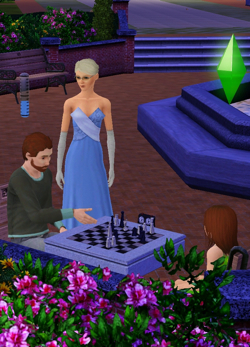So I was on the official forums today. There was this one post about races and role-play. In a development that will surprise maybe two people, gnomes got bashed about as an unpopular choice.
Sigh.
Look, in truth, I get it. I do. I think I do, anyway. They’ve barely got any lore! They’re nothing but comedic relief! They’re cute and silly, and cute nor silly belongs in the World of Warcraft! Yes, yes. But here’s the thing.
They’ve barely got any lore: To some degree, true. I sympathise, I really do, with those who argue the gnomes pushed the High Elves out of the game. More or less, that’s correct. But the gnomes have gotten a lot more lore love as the game has gone on. The Ulduar revelations; that gnomes are under the surface (figuratively) robots is a really neat twist and one with a lot of potential. The battle to retake Gnomeregan is building up to epic levels. It just isn’t true any more that they don’t have any lore behind them. This far down the trail, all the initial eight races have got to have some lore to play with.
They’re nothing but comedic relief! Does this guy look like he’s kidding around to you? Yes, the gnomes have a lot of potential as comic relief, and Blizzard enjoys playing with it. But the gnomes have a surprisingly tragic backstory, they’re very powerful mages (one of only three PC races as part of the Kirin Tor) and are, in short (no pun intended) people like any other.
They’re cute and silly, and cute nor silly belongs in the World of Warcraft! Mini-pets! Half the darn quests! The constant in-jokes! Have you been playing the same game as me? World of Warcraft is comedic fantasy with stretches into the epic. Always has been. Wrath of the Lich King was, it’s true, a particularly dark expansion. But even there the in-jokes flew thick and fast. There is equal room in the game for silly and serious.
And here’s the thing: The gnomes are perfectly placed within both the silly and the serious traditions of World of Warcraft. They have the best one-two punch in the game. (Jess would call it Mood Whiplash) Everyone expects gnomes to be silly, and funny, and jokey. So the moments when you ditch that, and go for inspirational, heartbreaking, or brutal are all the more shocking. Nobody does this better than gnomes. Nobody.
Gnomes are funny. But gnomes are also the product of a horrific story of disaster and death. They can be efficient; not coldly, but horrifically cheerfully. (Imagine a rugged human spymaster rogue ruefully reflect that allowing the Scourge to take a city will ultimately save more in the long run. Now imagine a gnome rogue cheerfully observing the same. “Why are you so glum? Oh, this is absolutely minor in comparison. So a few thousand people will die in horrible suffering. We just saved millions! This is great!” I’d posit the latter is the more horrifying.) They dream big, and are crushed when those dreams fail.
So quit punting the gnomes. Gnomes are awesome.
ps. We are not here this is not a post hi anyone reading this but seriously we’re not bringing Blogatelle back. This is just a one-off.

